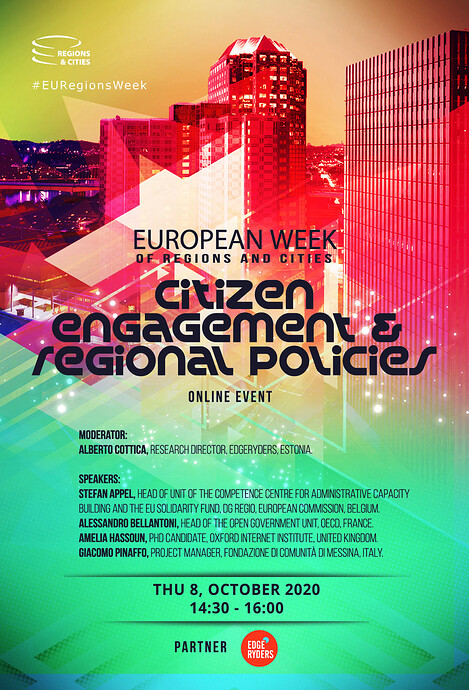As many people here know, we are preparing a session called Citizen Engagement and Regional Policies, to take place within the context of the European Week of Cities and Regions. It takes place on October 8th from 14.30 to 16.00, on Zoom. It is fully booked, with 150 registrations ![]() . The participants are very diverse: public servants at all levels, from the city to the Commission, European networks, consultants, academics and so on. In this thread, we work out what will actually happen.
. The participants are very diverse: public servants at all levels, from the city to the Commission, European networks, consultants, academics and so on. In this thread, we work out what will actually happen.
The agenda
14.30-14.40 Intro & housekeeping
14.40 - 15:15 invited speakers
15:15 - 15.30 individual work & coffee
15.30 - 16.00 open discussion chat.
Sneak peek on the content
Introduction by me (@alberto), 5 minutes. I am going to claim that citizen engagement is an obviously good idea which has mostly underdelivered in our experience. Part of this disappointing performance, however, has to do with the tendency of decision makers to restrict it to a very narrow Overton window: “how you want X done?” rather than “do we need X at all?”. Regional policies in particular are characterized by the idea of “convergence”: everybody should imitate the “model” regions. This sets peripheral regions up to fail, and it is not at all clear that the inhabitants of, say, Thessaly have a particular desire to reproduce the economy of Bavaria.
Regional policies are a spectacular opportunity that Europe, and only Europe, has to experiment with different economic models. Doing so would help accelerate the transition towards a circular, low-carbon, just, green economy that we need to achieve anyway; we can try many ideas at a time, discard those which don’t work and scale those that do. I suspect that involving citizens in shaping policies for regions to follow their own approach to the transition would result in very high-quality participation, and consensus for bold policies would make them more effective.
Prepared interventions by our four official speakers. 7 minutes each, with no slides (if people feel they need slides that’s cool too).
-
Alessandro Bellantoni (Head of the Open Government Unit, OECD) sets the stage. The OECD has an extensive programme of work citizen participation. There seems to be a paradox: citizen demand participation channels, while at the same time decision makers complain of how difficult it is to get them involved. Why?
-
@amelia Hassoun (Anthropologist, Oxford Internet Institute) discusses her work on smart cities. Smart cities are an example of policy with a strong technocratic flavour. As an ethnographer, Amelia’s job is to render how these policies look like from the point of view of the impacted citizens. What is her take on engagement? Is it low? Or is it not being captured by the “official” debate?
-
@giacomo.pinaffo (Project manager, Fondazione di Comunità Messina) presents the experience of Messina. Sicily is supposed to be a “difficult” region, with low trust in the institutions. How did his Foundation achieve high level of trust and participation of citizens? Several dimensions are interesting here, for example stability of policies and the emphasis of increasing the range of choices that people can make (à la Sen).
-
Stefan Appel (Head of Unit of the Competence Centre for administrative capacity building and the EU solidarity fund, DG REGIO) brings a policy makers’ point of view. What does the issue of citizen engagement look like to DG REGIO? Why does the Commission think it is so important? Is the issue similar across the 244 NUTS-2 regions, or are there differences, and what can we say about them? What needs to be done?
Individual work and coffee. We have too many participants for breakout rooms. instead, we give people the link Edgeryders Forms and ask individuals (not groups) to post their takes on the citizen engagement-regional policies nexus: experiences, questions to panelists, statements.
Open discussion. Moderated by me on the audio/video channel, by @MariaEuler on the chat. We invite questions and the sharing of experiences, also using those that come through the tell.edgeryders.eu channel. I pick some up, and invite panelists to react. Of course, panelists can also ask questions, as well as step forward to react to questions they are interested in.
Any thoughts?
